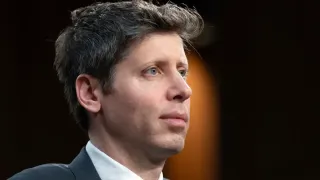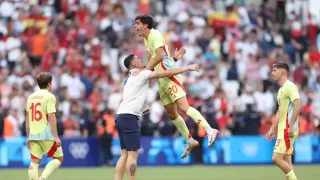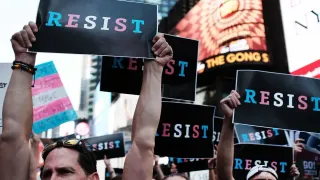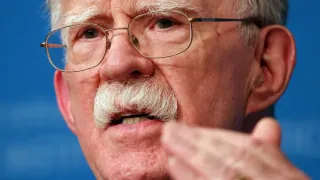
5 hours ago
'No Kings' Protests Return As Trump Ramps up Authoritarian Practices, Organizers Say
Safiyah Riddle READ TIME: 4 MIN.
Big crowds of protesters are expected Saturday in thousands of places around the U.S. in opposition to what some are characterizing as increasingly authoritarian practices by President Donald Trump.
It's the second "No Kings" protest and third mass movement against the administration this year, and it comes amid an intensifying conflict between federal law enforcement and protesters nationwide.
Some conservative politicians have condemned the protests as “Hate America" rallies, while others say that it represents a “patriotic” fight for First Amendment rights.
Here is what to expect on Saturday.
Ezra Levin, a leading organizer of Saturday’s protests, said the demonstrations are a response to what he called Trump’s “crackdown on First Amendment rights.”
Levin, the co-executive director of the nonprofit Indivisible, pointed to Trump's sweeping immigration crackdown, his unprecedented promises to use federal power to influence midterm elections, restrictions on press freedom and retribution against political opponents.
He said those steps cumulatively represented a direct threat to constitutionally protected rights.
Protests are planned for more than 2,500 locations nationwide — from the country's largest city, New York, to small unincorporated, rural communities like East Glacier Ridge, Montana, with roughly 300 residents.
Organizers will consider the day a success, Levin said, if people are galvanized to become more politically involved on an ongoing basis.
The last “No Kings” protest took place on June 14 in thousands of cities and towns across the country, in large part to protest a military parade in Washington that marked the Army’s 250th anniversary and coincided with Trump’s birthday. “No Kings” organizers at the time called the parade “coronation” that was symbolic of what they characterized as Trump’s growing authoritarian overreach.
Confrontations were isolated and the protests were largely peaceful.
Police in Los Angeles, where protests over federal immigration enforcement raids erupted the week prior and sparked demonstrations across the country, used tear gas and crowd-control munitions to clear out protesters after the formal event ended. Officers in Portland also fired tear gas and projectiles to disperse a crowd that protested in front of a U.S. Immigration and Customs Enforcement building well into the evening.
One protester was killed during the Salt Lake City march in June. A safety volunteer shot at a person allegedly pointing a rifle at demonstrators, but inadvertently struck and killed protester Arthur Folasa Ah Loo, a beloved fashion designer.
Four months later, no one has been charged. Experts have said state gun laws may shield both the shooter and the man who brandished a rifle but didn't fire shots.
Jamie Carter, an organizer of Saturday's rally, said Utah activists considered not participating in this round of “No Kings" demonstrations, but “we also felt that we really had to get back out there.”
Organizers are not affiliated with the groups who put on the June demonstration that turned deadly. Safety volunteers will be present but unarmed, and all have received de-escalation training, said Carter, of Salt Lake Indivisible. Attendees have been asked not to bring weapons.
“We really want this to be a very uplifting, happy event of people coming together in a community to kind of try to erase and replace some of the bad memories,” she said.
Concerns about large political demonstrations remain heightened in Utah, where conservative activist Charlie Kirk was also assassinated during a speaking event last month.
Trump’s crackdown against protests, especially in Democratic cities, has intensified since the June marches. He has since sent National Guard troops to Washington, D.C., and Memphis, Tenn. His efforts to deploy troops to Chicago and Portland, Oregon, have stalled in federal court.
Organizers in Chicago are expecting tens of thousands of demonstrators at a popular Lake Michigan park, followed by a downtown march.
Federal immigration agents have arrested more than 1,000 people in Chicago, the nation’s third largest city, with increasingly aggressive tactics since September. Protests have been frequent and well attended in recent weeks, and have boiled over in intense clashes outside a suburban federal immigration processing center.
“People are angrier. It feels so much more immediate,” said Denise Poloyac with Indivisible Chicago. “They’re very concerned about what’s happening in Chicago and around the country.”
The “No Kings” organizers have led numerous virtual safety trainings leading up to the protests with the help of the American Civil Liberties Union, which is listed as an official partner on the “No Kings” website.
The trainings informed viewers about their rights during protests — such as whether you are required to carry ID or if wearing a mask is allowed (both vary according to each state) — and emphasized de-escalation techniques for encounters with law enforcement.
Each official protest has a safety plan, which includes designated medics and emergency meeting spots.
The protests have already drawn swift condemnation from some of the country’s top politicians, with House Speaker Mike Johnson dubbing the event the “Hate America rally” at a news conference on Wednesday.
Some state leaders, like Texas' Republican Gov. Greg Abbott, have decided to activate the National Guard ahead of the protests.
“Texas will deter criminal mischief and work with local law enforcement to arrest anyone engaging in acts of violence or damaging property,” Abbott said in a statement.
Democratic California Gov. Gavin Newsom struck a more optimistic tone, saying he hopes Californians turn out in large numbers and remain peaceful. He said Trump “hopes there is disruption, there’s some violence” that he can exploit.






